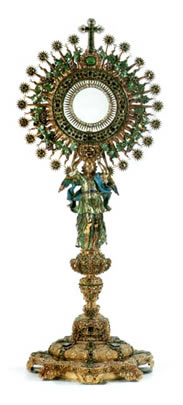
O salutaris Hostia
Quae coeli pandis ostium.
Bella premunt hostilia;
Da robur, fer auxilium.
Uni trinoque Domino
Sit sempiterna gloria:
Qui vitam sine termino,
Nobis donet in patria.
Amen.
Tantum ergo sacramentum
Veneremur cernui:
Et antiquum documentum
Novo cedat ritui:
Praestet fides supplementum
Sensuum defectui.
Genitori, genitoque
Laus et iubilatio,
Salus, honor virtus quoque
Sit et benedictio:
Procedenti ab utroque
Compar sit laudatio.
Exposition and Benediction of the Blessed Sacrament
Exposition
The Priest and his assistants approach the Altar, genuflect, and kneel on the lowest step. After a brief prayer, the Priest or Deacon stands, goes up to the Altar and there spreads the corporal. He uncovers the monstrance, unlocks and opens the tabernacle, and genuflects. Then taking the case which contains the sacred Host from its receptacle, he places it securely in the monstrance. The hymn O Salutaris hostia is begun at once. Taking care that the monstrance faces the congregation, the Priest genuflects, goes to the lowest step, and kneels. Then the Priest, standing at the foot of the Altar, puts on incense in the censer, (without blessing it, since only the Blessed Sacrament is to be censed); and, kneeling on the lowest step, he censes the Blessed Sacrament with three double swings, bowing his head profoundly before and afterwards.
O salutaris hostia
O Saving Victim opening wide
The gate of heaven to man below
Our foes press on from every side,
Thine aid supply, thy strength bestow.
All praise and thanks to the ascend
For evermore, blest One in Three;
O grant us life that shall not end,
In our true native land with thee. Amen
If Evensong is to be sung in the presence of the Blessed Sacrament, the Priest and his attendants then move to the sedilla for the Office. The censing at the Magnificat is of the Sacrament only, the priest kneeling as above. Otherwise, a litany or hymn of praise may be sung, or some devotion appropriate to the time; e.g., the Te Deum (all standing) on great festivals or occasions of public rejoicing, or the Penitential Office on Ash Wednesday.
Adoration and Benediction
During the second line of the following hymn, all should humbly bow: at the beginning of the second stanza incense is offered as before.
Tantum ergo Sacramentum
Therefore, we before him bending,
This great Sacrament revere;
Types and shadows have their ending,
For the newer rite is here;
Faith, our outward sense befriending,
Makes our inward vision clear.
Glory let us give and blessing
To the Father and the Son;
Honor, thanks, and praise addressing,
While eternal ages run;
Ever too his Love confessing
Who, from both, with both is one. Amen
Still kneeling, the Priest sings:
V. Thou gavest them breat from heaven (Alleluia)
R. Containing in itself all sweetness. (Alleluia)
Let us pray.
O God, who in a wonderful Sacrament has left unto us a memorial of thy Passion: grant us, we beseech thee, so to venerate the sacred mysteries of they Body and blood, that we may ever perceive within ourselves the fruits of thy redemption. Who livest and reignest work without end. Amen
Kneeling, the Priest receives the humeral veil on his shoulders. Then he goes up to the Altar, genuflects, takes the monstrance into his hands, holding it with the ends of the veil. Turhing by his right to the people, the Priest gives the Blessing (or Benediction) in silence, making the sign of the Cross with the monstrance over the kneeling congregation meanwhile an acolyte rings the sanctus bell thrice; and the thurifer censes the Blessed Sacrament with three double swings. The people may make the sign of the Cross and bow in fervent adoration, saying silently,
Blessed, praised and adored by Jesus
in the most Holy Sacrament.
Turning back to the Altar by his right, the Priest places the monstrance on the Altar, genuflects, and goes to kneel at the foot of the Altar. He gives the humeral veil back to the Server. The Divine Praises are said by the Priest, the people repeating them after him, all kneeling. At the Celebrant's discretion, additional Praises may be added.
The Divine Praises
Blessed be God.
Blessed be his holy name.
Blessed be Jesus Christ, true God and true man.
Blessed be the name of Jesus.
Blessed be his most Sacred Heart.
Blessed be his most Precious Blood.
Blessed be Jesus
in the most Holy Sacrament of the Altar.
Blessed be the Holy Spirit, the Paraclete.
Blessed be the Mother of God, Mary most holy.
Blessed be her holy and Immaculate Conception.
Blessed be her glorious Assumption.
Blessed be the name of Mary, Virgin and Mother.
Blessed be Saint Joseph, her most chaste spouse.
Blessed be God in his angels and in his saints.
The Priest rises, goes to the Altar, genuflects, and removing the case containing the sacred Host from the monstrance, puts it back into its receptacle. This is replaced in the tabernacle. The Priest genuflects, closes and locks the tabernacle, puts the corporal back into its burse, veils the monstrance, and goes to stand at the foot of the Altar.
Ant. Let us for ever adore: the most holy Sacrament. (Alleluia.)
Psalm 117 Laudate Dominum
O praise the Lord, all ye nations:*
Praise him, all ye peoples.
For his merciful kindness is ever
more and more toward us:*
and the truth of the Lord
endureth for ever. Praise the Lord
Glory be . . .
The Priest and his assistants may leave the sanctury after the first half of the Gloria Patri has been sung.
